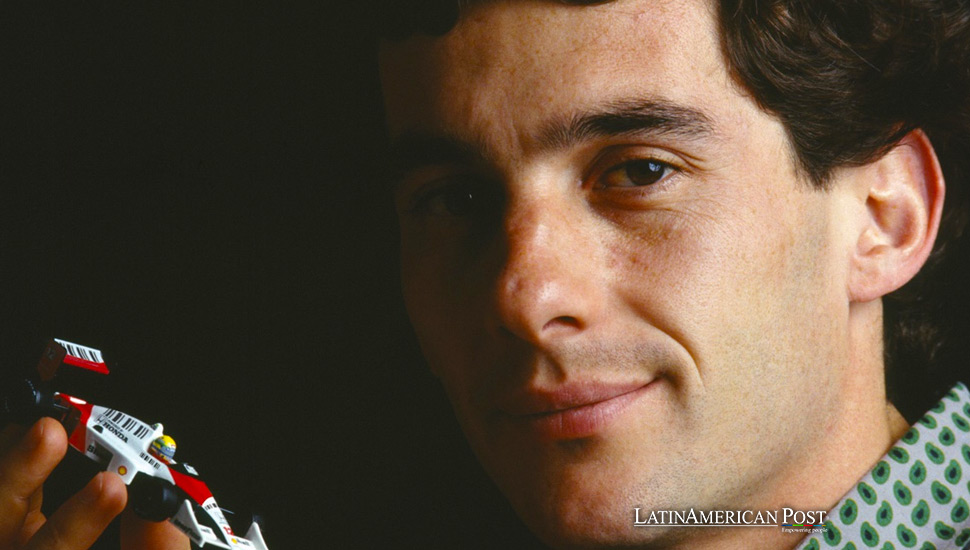Senna’s Legacy: Three Decades of Speed, Spirit, and Inspiration in Brazil and Beyond

Nearly three decades after his tragic death, Ayrton Senna’s legacy continues to ignite the spirit of Brazil and the racing world. As a symbol of relentless determination and national pride, Senna’s career and untimely demise still resonate deeply, inspiring new generations with his legendary life and achievements.
Ayrton Senna da Silva, born on March 21, 1960, in São Paulo, Brazil, was not just a child of affluence but one with racing imprinted in his DNA. His passion for speed ignited at four when his father built him a go-kart. This early exposure was the catalyst for a journey that would redefine motorsport. Senna’s karting prowess quickly became evident, leading him to clinch the South American Kart Championship at 17.
From Karting Tracks to International Stages
Senna’s early years in kart racing laid the groundwork for a career defined by sheer determination and raw talent. His journey from the karting tracks of São Paulo to the pinnacle of Formula 1 is a testament to his relentless pursuit of excellence. Despite his privileged background, Senna’s path was not without obstacles. He faced fierce competition and challenging conditions, especially during his time in Europe, where he honed his skills and determination. Senna’s transition from karting to single-seater racing in Europe marked the beginning of a new chapter. His performances in Formula Ford and Formula 3 showcased his talent and determination.
Senna burst onto the Formula One scene in 1984, a fiery talent brimming with ambition and raw speed. His ascent coincided with a transformative period in Brazil’s history. Emerging from the shadows of military rule, the country yearned for a new generation of heroes, figures who could restore national pride and project Brazilian excellence onto the world stage. With his audacious driving style, relentless drive for victory, and captivating persona, Senna answered that call.
Dominance on the Track and Beyond
His maiden Formula One triumph at the rain-soaked 1985 Portuguese Grand Prix was a sporting achievement and a declaration of Brazilian potential. When he clinched his first World Championship in 1988, his success became intertwined with the resurgence of Brazilian democracy. Streets across the country exploded in ecstatic celebration, with Senna’s iconic yellow helmet symbolizing a renewed sense of national optimism.
In 1988, Senna joined McLaren, a partnership that would etch his name in history. His intense rivalry with teammate Alain Prost captivated the world, epitomizing the pinnacle of racing competition. Senna secured three World Championships (1988, 1990, and 1991), with the 1988 title highlighting his dominance. His six wins at the Monaco Grand Prix underscored his mastery of one of the most challenging circuits.
Senna was not just a driver but a pioneer who pushed the boundaries of technology in Formula 1. His inputs were crucial in developing active suspension and improving car performance. Yet, his career wasn’t without controversy; his on-track clashes with Prost and others sparked debates about sportsmanship and the dangerous nature of high-speed racing.
The 1994 San Marino Grand Prix at Imola was a dark chapter in motorsport history—accidents, including the fatal crash of Roland Ratzenberger during qualifying, marred the weekend. The following day, on May 1, the world watched in horror as Senna’s car crashed at the Tamburello corner, leading to his instantaneous death. This tragic event, occurring at the pinnacle of his career, left a void in Formula 1 and the hearts of millions. Senna’s death led to significant safety improvements in Formula 1, a testament to his enduring impact. But his legacy extends beyond the track.
In Brazil, Senna was more than a sports icon; he symbolized hope during economic uncertainty and political transition. His victories were celebrated as national triumphs, bringing joy and pride to a country struggling with debt and hyperinflation. Senna’s success provided a welcome distraction from daily hardships, and his dedication to Brazil’s advancement, mainly through education and philanthropy, endeared him to the public. The Ayrton Senna Institute, founded by his sister Viviane, continues his legacy, focusing on education for underprivileged Brazilian children.
Senna’s influence permeated Latin America, where he was revered as a unifying figure. His legacy was particularly poignant in countries like Argentina, Mexico, and Colombia, where motorsport enthusiasts admired his tenacity and skill. His death in the 1994 San Marino Grand Prix was mourned across the continent, with communities uniting in grief and admiration for a man who had become a regional hero.
The aftermath of Senna’s passing saw a wave of tributes and memorials, illustrating the profound impact of his life and career. In Argentina, he was mourned as a fellow South American sports icon; newspapers and fans paid homage to his legacy in Mexico. Across Latin America, Senna’s spirit was honored through various commemorations, reflecting the deep respect and affection he had garnered.
Senna’s impact transcended his achievements behind the wheel in a region often burdened by negative stereotypes and economic challenges; he represented more than just a skilled driver. Senna symbolized the unwavering pursuit of greatness, proving that Latin Americans could compete against the world’s best and conquer them. His legendary battles with European rivals, most notably his intense duel with French champion Alain Prost, painted him as a defiant underdog. This fighter refused to be intimidated by the traditional powers of motorsport. Senna’s defiance was theirs in a region striving for recognition and respect.
Beyond the accolades, Senna was a deeply committed philanthropist. Concerned about the extreme poverty and inequality that plagued his homeland, he quietly established the Instituto Ayrton Senna, a foundation focused on improving educational opportunities for disadvantaged Brazilian children. His actions off the track solidified his status as a role model and cemented his legacy as a champion for social justice.
The tragic events at Imola in 1994 cut short a brilliant career and sent shockwaves through the world of Formula One. Senna’s death ignited crucial conversations about driver safety, leading to rigorous reforms and regulatory changes that undoubtedly continue to protect drivers today.
A Pioneer and Controversies
Senna’s loss devastated millions across Latin America. In Brazil, his funeral became a national moment of mourning, with tens of thousands lining the streets to pay their respects. But his memory echoed far beyond Brazil’s borders. From the bustling streets of Mexico City to the quiet villages of the Andes, Latin Americans of all backgrounds felt a sense of shared loss. Here was a figure who transcended nationality, a sportsman whose dedication and daring embodied the hopes and aspirations of an entire continent.
Also read: Exploring the Business of Soccer in Latin America
The passage of time has yet to diminish Senna’s influence. His life story is a powerful reminder of the inextricable link between sports, social change, and national identity. For Latin America, Senna is more than just a name on a trophy; he symbolizes the region’s boundless potential, capacity for excellence, and unyielding drive to succeed. Three decades later, the vibrant murals depicting his likeness, found on city walls from Rio de Janeiro to Bogota, testify to his enduring status as a beloved hero. Every young Latin American racer dreams of emulating his path, a testament to Senna’s power to inspire and ignite the belief that anything is possible.





